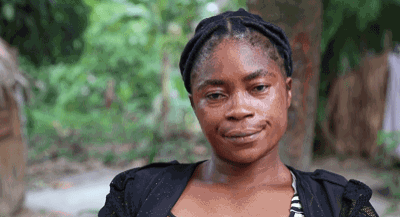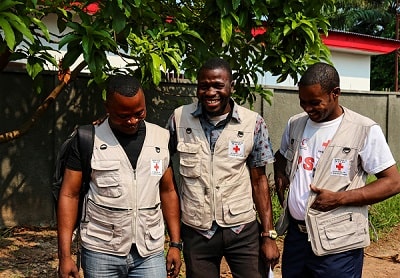However, what we are not hearing about are the real-life consequences of the virus on survivors, on their family and on their community.
 “When my husband died from the Ebola virus, even my own family rejected us. Imagine the rest of the community,” explained Irène, a mother of six boys. “People fear what they don’t understand. Some are afraid of being contaminated, others believe it’s witchcraft.” In May 2018, Irène’s life turned upside down. Not only did she lose her husband, but the people of her village no longer wanted to buy her vegetables and they avoided her like the plague. “The saddest part was seeing my children isolated from the other kids. Red Cross volunteers were the ones who helped us weather the storm.”
“When my husband died from the Ebola virus, even my own family rejected us. Imagine the rest of the community,” explained Irène, a mother of six boys. “People fear what they don’t understand. Some are afraid of being contaminated, others believe it’s witchcraft.” In May 2018, Irène’s life turned upside down. Not only did she lose her husband, but the people of her village no longer wanted to buy her vegetables and they avoided her like the plague. “The saddest part was seeing my children isolated from the other kids. Red Cross volunteers were the ones who helped us weather the storm.” Irène and her family received help from Red Cross psychosocial support volunteers from Mbandaka, who were trained during the 2018 Ebola outbreak in Équateur Province. “Our role, says team leader Malachi Malaka, is to listen to the people who are mentally impacted by events and to help them reintegrate their community. Little by little, we try to rebuild connections.” To do this, the team works with communities and their leaders as well as with traditional healers. Among other things, the team raises awareness of the disease and its consequences by collaborating with volunteers from the affected community. “If we want to make a real impact, it is important for the community and its leader to feel as though they are playing an active role in the decisions and measures that we wish to implement,” specified Malachi.
Irène and her family received help from Red Cross psychosocial support volunteers from Mbandaka, who were trained during the 2018 Ebola outbreak in Équateur Province. “Our role, says team leader Malachi Malaka, is to listen to the people who are mentally impacted by events and to help them reintegrate their community. Little by little, we try to rebuild connections.” To do this, the team works with communities and their leaders as well as with traditional healers. Among other things, the team raises awareness of the disease and its consequences by collaborating with volunteers from the affected community. “If we want to make a real impact, it is important for the community and its leader to feel as though they are playing an active role in the decisions and measures that we wish to implement,” specified Malachi.One year later, Malachi and his team optimistically pursue their volunteer efforts. “Although Irène’s children are now allowed to mix with the village’s other kids, it is not the case for every family.” This is why Malachi was deployed to North Kivu, to support his colleagues in the eastern part of the country, who are dealing with the worst outbreak in history. Together, they are fighting against prejudice and helping communities stand together.

